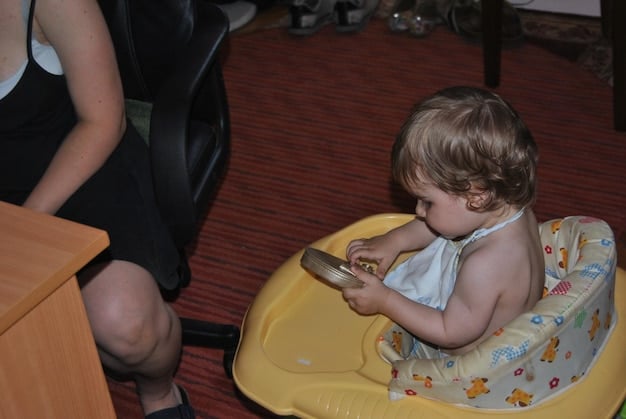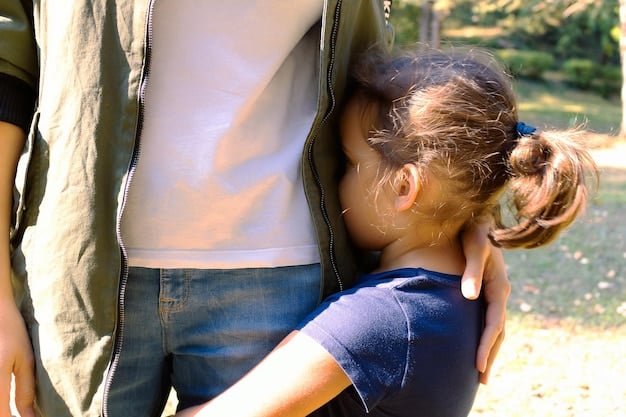Potty Training Regression: Get Back on Track in 7 Days

Potty training regression is when a child temporarily loses established potty training skills; with a structured approach focusing on patience, consistency, and positive reinforcement, parents can help their child get back on track within about a week.
Experiencing potty training regression can be frustrating for both parents and children. But don’t worry, it’s a common issue, and with the right strategies, you can help your little one regain those skills in about a week. This guide provides practical tips and expert advice to navigate this challenging phase with patience and understanding.
Understanding Potty Training Regression
Potty training regression is a setback in your child’s potty training journey. It involves a child who was previously successful at using the toilet suddenly experiencing accidents or refusing to use the potty altogether. Now, let’s explore the underlying reasons behind this, distinguishing it from initial training difficulties.
What is Potty Training Regression?
Potty training regression isn’t merely a child having occasional accidents. It’s a noticeable and consistent step back after a period of successful toilet use. This can manifest as frequent accidents, refusal to use the toilet, or even bedwetting after being dry at night.
Common Causes of Regression
Several factors can trigger potty training regression. Identifying the root cause is crucial for addressing the issue effectively. These causes often fall into emotional, physical, or environmental categories.
- Stress or Anxiety: Major life changes like a new sibling, moving, or starting daycare can cause stress.
- Illness: Physical discomfort from a urinary tract infection or constipation can lead to accidents.
- Change in Routine: Disruptions to the daily schedule can throw off a child’s ability to regulate their bladder and bowels.
- Seeking Attention: Sometimes, regression is a way for a child to get extra attention from their parents.

Understanding these potential triggers will help you better address your child’s specific needs during this phase.
Assess the Situation and Identify Triggers
Before you start making changes, take a step back and try to figure out what might be causing the regression. This involves careful observation and open communication with your child if they’re old enough to express themselves.
Observe Your Child’s Behavior
Keep a close eye on your child’s behavior and routines. Note when the accidents occur, what activities they were engaged in beforehand, and their emotional state. Are they showing signs of stress, anxiety, or fatigue?
Talk to Your Child (If Possible)
If your child is verbal, try gently inquiring about what’s going on. Avoid scolding or showing frustration, as this can exacerbate the problem. Instead, create a safe space for them to express their feelings.
Rule Out Medical Issues
Consult with your pediatrician to rule out any underlying medical conditions, such as a urinary tract infection or constipation. These can directly impact bladder and bowel control.
- Schedule an Appointment: If you suspect a medical issue, don’t delay scheduling a visit with your child’s doctor.
- Discuss Symptoms: Be prepared to describe the symptoms you’ve observed, including frequency and any associated discomfort.
- Follow Medical Advice: Adhere to any treatment plans prescribed by the pediatrician.
By carefully assessing the situation, you’ll be better equipped to tailor your approach and provide the necessary support. Remember, patience is key during this stage.
Re-Establish a Consistent Potty Routine
Once you’ve identified potential triggers, the next step is to re-establish a consistent and predictable potty routine. Consistency helps reassure your child and reinforces the learned behavior.
Set Regular Potty Times
Establish specific times for your child to sit on the potty, such as after waking up, before meals, and before bedtime. Even if they don’t need to go, the routine helps reinforce the habit.
Use Positive Reinforcement
Praise and reward your child for any success, no matter how small. A sticker chart, small toy, or extra playtime can motivate them to cooperate. Avoid punishment or scolding, as this can create negative associations with potty training.
Avoid Power Struggles
If your child refuses to sit on the potty, don’t force them. This can lead to a power struggle and make the situation worse. Instead, try again later or offer a compromise, such as reading a book while they sit on the potty.
Creating a consistent and positive routine can help your child feel more secure and in control.
Reduce Stress and Anxiety
Since stress and anxiety are common triggers for potty training regression, it’s important to create a calm and supportive environment for your child. Addressing underlying emotional issues can make a significant difference.
Identify and Address Stressors
Pinpoint any stressors in your child’s life, such as a new sibling, changes in daycare, or family conflicts. Provide reassurance and support to help them cope with these challenges.
Create a Relaxing Bedtime Routine
Establish a calming bedtime routine to reduce nighttime anxiety and bedwetting. This might include a warm bath, reading a story, and gentle music.
- Limit Screen Time: Avoid screen time before bed, as the blue light can interfere with sleep.
- Use a Nightlight: A dim nightlight can help ease anxiety and make it easier for your child to get to the bathroom at night.
- Talk About Feelings: Encourage your child to express their feelings and anxieties before bedtime.
Offer Extra Comfort and Reassurance
Provide extra cuddles, attention, and reassurance to help your child feel secure. Let them know that you understand they’re going through a tough time and that you’re there to support them.

By reducing stress and anxiety, you can help your child regain their confidence and control over their bladder and bowels.
Use Positive Reinforcement and Avoid Punishment
Positive reinforcement is a powerful tool in overcoming potty training regression. It focuses on rewarding desired behaviors, encouraging your child to cooperate willingly. Conversely, punishment can create fear and resistance, hindering progress.
Reward Successes
Whenever your child successfully uses the potty, offer immediate praise and a small reward. This could be a sticker, a small toy, or extra playtime. Consistency is key to reinforcing the connection between the action and the reward.
Ignore Accidents
Accidents should be handled calmly and without scolding. Clean up the mess without making a fuss, and remind your child that they can try again next time. Focus on the positive behaviors you want to encourage.
Avoid Negative Language
Refrain from using negative language or expressing frustration. Phrases like “You should know better” or “You’re a big kid now” can make your child feel ashamed and anxious. Focus on encouragement and support instead.
Positive reinforcement creates a more encouraging and effective learning environment.
Be Patient and Persistent
Overcoming potty training regression requires patience and persistence. It’s important to remember that setbacks are normal, and it may take some time for your child to regain their skills. Don’t give up, and continue to provide consistent support.
Set Realistic Expectations
Understand that there will be good days and bad days. Don’t expect overnight success, and be prepared to adjust your approach as needed. Celebrate small victories and focus on progress rather than perfection.
Stay Consistent
Consistency is crucial for reinforcing the newly established routine. Stick to the potty schedule, use positive reinforcement, and avoid punishment. Inconsistency can confuse your child and prolong the regression.
Seek Support
Don’t hesitate to seek support from other parents, friends, or a healthcare professional. Sharing your experiences and getting advice can help you stay motivated and find new strategies.
With patience and persistence, you can help your child overcome potty training regression and regain their confidence.
When to Seek Professional Help
While most cases of potty training regression resolve with consistent home-based strategies, there are instances when professional help is necessary. Recognizing these situations ensures your child receives the appropriate care.
Persistent Regression
If the regression persists for more than a few weeks despite your efforts, it may be time to consult a healthcare professional. Prolonged regression could indicate underlying issues that require medical or psychological intervention.
Underlying Medical Conditions
If you suspect a medical condition, such as a urinary tract infection or constipation, consult with your pediatrician. Medical issues can directly impact bladder and bowel control and need to be addressed promptly.
Significant Emotional or Behavioral Issues
If the regression is accompanied by significant emotional or behavioral issues, such as severe anxiety, depression, or aggression, seek help from a child psychologist or therapist. These issues can contribute to the regression and may require professional treatment.
Knowing when to seek professional help ensures your child receives the necessary support to overcome potty training regression.
| Key Point | Brief Description |
|---|---|
| 🔄 Identify Triggers | Determine the cause of regression, such as stress or illness. |
| ⏰ Consistent Routine | Re-establish regular potty times to reinforce the habit. |
| 👍 Positive Reinforcement | Reward successes and avoid punishment for accidents. |
| ❤️ Patience & Support | Offer comfort, reassurance, and understanding throughout the process. |
Frequently Asked Questions
▼
Potty training regression can be triggered by stress, changes in routine, illness, or emotional factors like a new sibling. Identifying the cause helps address the issue properly.
▼
With consistent and supportive strategies, potty training regression usually resolves within a week or two. If it lasts longer, consider consulting a healthcare professional.
▼
No, punishment is not recommended. It can create negative associations with potty training and increase anxiety. Focus on positive reinforcement and supportive encouragement.
▼
Praise successes, offer stickers or small toys as rewards, and create a sticker chart. Celebrate progress, no matter how small, to keep your child motivated.
▼
Seek professional help if regression persists for more than a few weeks, if you suspect a medical condition, or if there are significant emotional or behavioral issues involved.
Conclusion
Potty training regression can be a frustrating experience, but understanding the causes and implementing consistent, positive strategies can help your child get back on track within a week. By providing a supportive environment, addressing underlying stressors, and celebrating successes, you can navigate this challenge with patience and understanding.





